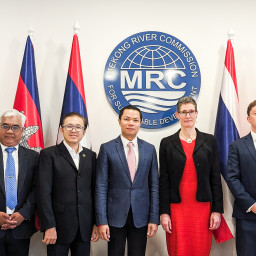Mekong Ministers meet in Hua Hin to discuss water issues
Hydropower, climate change, fisheries and flood management loom large for the Mekong Basin, with ministers from four countries meeting in Hua Hin this week to discuss strategies for trans-boundary river management.
The annual meeting of the Mekong River Commission (MRC) Council was an opportunity for Cambodia, Lao PDR, Thailand and Viet Nam to share views and discuss the future direction of the river basin, as well as how Member Countries can assist each other in addressing the challenges posed by increasing pressures on water resources.
Minister of Natural Resources and Environment, H.E. Mr. Suwit Khunkitti, addressing the meeting stressed the need for holistic approach of integrated water resource management together with concerted action on a range of global environmental issues.
“Environmental security is high on the agenda for all the Mekong countries,” he said. “For example, we all stand to lose if we do nothing to adapt to and mitigate the threat of climate change or develop water resources infrastructure without ensuring that the extensive use of existing benefits of the river such as fisheries are protected. Likewise, we all collectively stand to gain from the sustainable use of water resources. The key principle here is that sustainability cannot be achieved without cooperation between Member Countries.”
“This is the approach of Integrated Water Resource Management looking at a wide spectrum of different functions and utilisation of water together with the broader consultation of stakeholders,” he added.
Cambodia, Lao PDR, Thailand and Viet Nam are working together on a basin-wide “Integrated Water Resource Management” strategy, which will have a direct influence on the way in which each country manages such activities as irrigation, hydropower and other aspects of water-use over coming years. Also on the agenda was a five year strategic plan for the organisation.
“The increasing demand for hydropower, the potential impact of climate change and the expanding population of the region will add to the pressure on water resources,” said Jeremy Bird, CEO of the MRC. “However, if the river’s resources are managed in a sustainable way, through regional cooperation and integration, they can be a great tool for poverty alleviation and development. The MRC is a unique example of how neighbouring countries can use natural resources to foster growth and prosperity.”
The Ministers also discussed the potential impact on the environment, fisheries and people's livelihoods of eleven hydropower dams that are proposed by developers for the mainstream Mekong and how the four member Countries can work to balance these impacts against their economic and poverty alleviation priorities.
The MRC has recently begun a Strategic Environmental Assessment into these proposals and the Government of China has agreed to take part in this study, which will give a full picture of the consequences of hydropower in the entire basin.
Development Partners to the MRC were also present at the meeting – with the French government providing 500,000 Euros to the MRC’s environmental management programme and the Belgian government announcing 7 million Euros worth of support to the MRC’s navigation programme and initiative on sustainable hydropower.
-ends-
Notes to Editors
The MRC Council’s role is to make policy decisions and provide other necessary guidance concerning the promotion, support, co-operation and co-ordination of joint activities and programmes in order to implement the 1995 Agreement on the Cooperation for the Sustainable Development of the Mekong River Basin and it has overall governance of the MRC. The 1995 Agreement between the governments of Cambodia, Lao PDR, Thailand and Viet Nam came about as the four countries saw a common interest in jointly managing their shared water resources and developing the economic potential of the river.
The MRC Secretariat, which is based in Vientiane, is the operational arm of the MRC and provides technical and administrative services to the Council as well as the MRC Joint Committee. Each member country also has a National Mekong Committee that coordinates MRC programmes at the national level and provides links between the MRC Secretariat and the national ministries and line agencies.
The MRC is responsible for cooperation on the sustainable management of the Mekong Basin. In dealing with these challenges, it looks across all sectors including sustaining fisheries, identifying opportunities for agriculture, maintaining the freedom of navigation, flood management and preserving important ecosystems. Superimposed on these are the future effects of more extreme floods, prolonged drought and sea level rise associated with climate change. In providing its advice, the MRC aims to facilitate a broad range of dialogue among governments, the private sector and civil society on these challenges.
For More Information, please contact:
Mr. Damian Kean, Interim Communication AdvisorTel: +856 56120695 or +856 21 263 263 Ext. 4703
Email: damian@mrcmekong.org
Mr Khy Lim, Communication Officer
Tel: +856 20 5622 8131
Email: khy@mrcmekong.org




